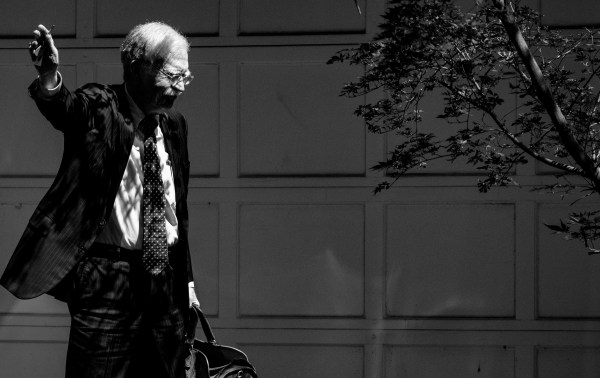Sen. Bill Cassidy, a Louisiana Republican, was among a bipartisan group of senators to visit China and South Korea last week. It was the first congressional delegation to China since 2019 and came amid strained relations between Washington and Beijing. During the trip, the senators met with Chinese President Xi Jinping. Cassidy spoke with The Dispatch about it this week, and the interview has been edited for length and clarity.
The Dispatch: What stood out to you during the trip?
Sen. Bill Cassidy: On the positive, it was the dynamism of Asia. Somebody once told me you can measure the prosperity of a city by the number of cranes in the skyline. And you go to Shanghai or to Seoul, and they’re just all over the place. They’re building new buildings in places where they already have lots of large buildings. The second thing, on the negative, when speaking to members of the business community or those in South Korea who do business in China, is the great uncertainty of doing business in China. There’s a fear of capriciousness. As one person told me, in the United States, you compete against the best companies in the world. In China, you do the same, but you also compete against the Chinese Communist Party (CCP). You’re never quite sure if the CCP is going to favor you. And it can be unclear as to why they don’t like you if they don’t like you.
Related to that is—just my assessment—the reason the Chinese were pleased to see us and gave us access to President Xi, for example, is they want more foreign direct investment. I don’t know this, but I’d like to think they want to deescalate the tension between our two countries. But they certainly want more investment. And I’m not quite sure they comprehended that their actions which have created this uncertainty in the business community are the reason they’re not getting the foreign direct investment.
The Dispatch: You met with Xi, the leader of a country the United States has said is committing genocide. How central were human rights to that conversation?
Cassidy: What we principally focused on most directly was fentanyl coming to our country, and the uneven trade practices that they denied but we alleged in which companies are favored in China and our American companies don’t get equal access, as Chinese companies do in the United States. Now, there was indirect conversation about other things, but not as elevated. For example, Taiwan, of course, they would bring up, but it wasn’t the centerpiece. When we talked about fentanyl, there is a Chinese agency the Trump administration sanctioned, and which the Biden administration continued to sanction because of their role with the Uyghurs. So we’d speak about fentanyl, and they would say, well, you’ve got this agency targeted by your government, and you’d have to remove the sanctions on them before we could begin to discuss more about fentanyl, because this is the agency which would be in charge of the operation, should we cooperate. In that way, it kind of indirectly came up.
We were very frank with Xi and his foreign minister. They have a perspective, and they did not shrink from their perspective. But on the other hand—my gosh—there have been tensions rising between our two countries. We don’t want to have war, and the way you hopefully prevent war is by first developing some line of communication. And I think we successfully, at least for the moment, did that.
The Dispatch: So to be clear, did any of the senators directly raise Xinjiang or the Uyghurs with President Xi?
Cassidy: We raised it—I can’t recall if we raised it directly. Because fentanyl is what we really pounded on, and trade relations. And you can only talk about so many things.
The Dispatch: What would you say to human rights activists who will read this interview and may feel demoralized that human rights weren’t at the forefront of these conversations?
Cassidy: I can’t tell you that we did not talk about it. I don’t have my notes with me. But we have 60,000 to 100,000 Americans dying annually from fentanyl. Everybody there felt compelled to address, in some way, the fentanyl issue. And the fact that every one of us felt compelled to address it drove it home. There’s only so many issues you can pound upon. I care deeply about human rights. I strongly support those issues that we’ve attempted to address with the Uyghurs. But we’ve got 100,000 Americans dying every year from drugs that seem to mostly be coming in from China through Mexico. We had to address that.
The Dispatch: This was your first time meeting Xi in person. What was your impression of him?
Cassidy: Oh, he was in command. People around him looked to him for directions. Occasionally, when we’d have a separate meeting, they would use a quote that he had used previously, and that he used again with us. I think with President Biden, Xi once said there’s a thousand reasons for us to get along, and there’s no reasons for us not to, or something like that. His foreign minister used the same quote, and Xi used it again with us. There’s a thousand reasons to meet, and there’s no reasons not to meet. He kind of sets the tone, sets the lead. I’ve heard different things, that maybe he has health problems. When you’re in the room with him, you don’t get any sense that he’s infirm or anything like that.
The Dispatch: Did you feel safe in China?
Cassidy: You know they’re spying on you. You presume they have cameras in every place, including your bathroom, including your hotel room. Every meeting, you assume there’s somebody there. I sometimes felt like some of the business leaders were careful in what they said, with the presumption that we were being monitored. But physically, I didn’t feel in danger.
The Dispatch: Did Xi talk about any other American policies or laws, beyond sanctions?
Cassidy: There was a lot of conversation about export controls. We pointed out that they also have export controls on us, and he goes, “Yes we do.” They were very realistic about it: We have some, you have some. On several occasions, we had this meta-conversation: I would say, for example, that the United States has things in which we are competing with China on, and there’s some things we frankly are going to confront each other on. But we don’t want competition to merge into confrontation when it doesn’t have to.
The Dispatch: Did anything about the trip lead you to change your views on China policy?
Cassidy: Let’s just say China’s not going away. China is a huge country with very talented people, and they have a social order in which they are going to accomplish things. You go there, and you understand it that much more. They have a business community that wants to work with the West. The average Chinese is as best I can tell, not hostile to the United States. Their government may try to whip up hostility, but as a rule, the Chinese people we met with in the business community want to have a productive relationship.
The Dispatch: Do you feel more optimistic or more pessimistic now about America’s relationship with China?
Cassidy: We need steely-eyed realism. We cannot assume anything we told them will come to pass. We do know their economy is slowing down, and they have an incentive to address things. I’m optimistic we can come up with policies that level the playing field economically and increase the possibility of cooperation through competition, while decreasing the risk of confrontation.






Please note that we at The Dispatch hold ourselves, our work, and our commenters to a higher standard than other places on the internet. We welcome comments that foster genuine debate or discussion—including comments critical of us or our work—but responses that include ad hominem attacks on fellow Dispatch members or are intended to stoke fear and anger may be moderated.
With your membership, you only have the ability to comment on The Morning Dispatch articles. Consider upgrading to join the conversation everywhere.